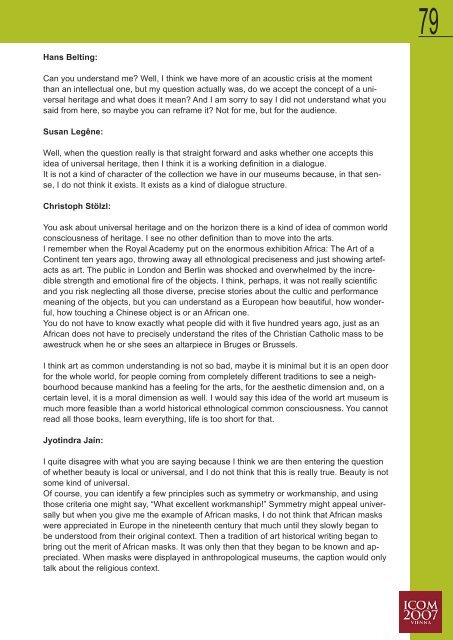general conferenc e & 22 - ICOM Österreich
general conferenc e & 22 - ICOM Österreich
general conferenc e & 22 - ICOM Österreich
You also want an ePaper? Increase the reach of your titles
YUMPU automatically turns print PDFs into web optimized ePapers that Google loves.
Hans Belting:<br />
can you understand me? Well, ithink we have more of an acoustic crisis at the moment<br />
than an intellectual one, but my question actually was, do we accept the concept of a universal<br />
heritage and what does it mean? and i am sorry to say i did not understand what you<br />
said from here, so maybe you can reframe it? not for me, but for the audience.<br />
Susan Legêne:<br />
Well, when the question really is that straight forward and asks whether one accepts this<br />
idea of universal heritage, then Ithink it is aworking definition in adialogue.<br />
it is not a kind of character of the collection we have in our museums because, in that sense,<br />
i do not think it exists. it exists as a kind of dialogue structure.<br />
Christoph Stölzl:<br />
Youask about universal heritage and on the horizon there is akind of idea of common world<br />
consciousness ofheritage. Isee no other definition than to move into the arts.<br />
iremember when the royal academy put on the enormous exhibition africa: the art of a<br />
continent ten years ago, throwing away all ethnological preciseness and just showing artefacts<br />
as art. the public in London and Berlin was shocked and overwhelmed by the incredible<br />
strength and emotional fire of the objects. I think, perhaps, it was not really scientific<br />
and you risk neglecting all those diverse, precise stories about the cultic and performance<br />
meaning of the objects, but you can understand as a european how beautiful, how wonderful,<br />
how touching achinese object is or an african one.<br />
Youdonot have to know exactly what people did with it five hundred years ago, just as an<br />
african does not have to precisely understand the rites of the christian catholic mass to be<br />
awestruck when he or she sees an altarpiece in Bruges or Brussels.<br />
ithink art as common understanding is not so bad, maybe it is minimal but it is an open door<br />
for the whole world, for people coming from completely different traditions to see a neighbourhood<br />
because mankind has a feeling for the arts, for the aesthetic dimension and, on a<br />
certain level, it is amoral dimension as well. iwould say this idea of the world art museum is<br />
much more feasible than aworld historical ethnological common consciousness. You cannot<br />
read all those books, learn everything, life is too short for that.<br />
Jyotindra Jain:<br />
iquite disagree with what you are saying because ithink we are then entering the question<br />
of whether beauty is local or universal, and idonot think that this is really true. Beauty is not<br />
some kind of universal.<br />
of course, you can identify afew principles such as symmetry or workmanship, and using<br />
those criteria one might say, “What excellent workmanship!” symmetry might appeal universally<br />
but when you give me the example of african masks, i do not think that african masks<br />
were appreciated in europe in the nineteenth century that much until they slowly began to<br />
be understood from their original context. then a tradition of art historical writing began to<br />
bring out the merit of african masks. it was only then that they began to be known and appreciated.<br />
When masks were displayed in anthropological museums, the caption would only<br />
talk about the religious context.<br />
79




